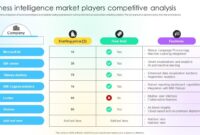How Business Intelligence Helps You Sell Smarter Not Harder introduces a game-changing perspective on sales strategies. In today’s fast-paced market, leveraging data and insights is no longer optional—it’s essential for staying ahead. By utilizing business intelligence, companies can optimize their sales processes, understand customer preferences, and make informed decisions that enhance productivity and effectiveness.
This insight not only allows businesses to identify market trends but also empowers sales teams to tailor their approaches, ensuring that they engage prospects in a meaningful way. With the right tools and strategies in place, selling smarter has never been more achievable, setting the stage for both increased revenue and long-term customer satisfaction.
In the ever-evolving landscape of technology, the transformation of artificial intelligence (AI) has proven to be one of the most significant advancements of recent times. AI has infiltrated various facets of our daily lives, from the smart assistants we use to manage our schedules to the sophisticated algorithms that drive our favorite streaming platforms. As we delve into this topic, we will explore the intricacies of artificial intelligence, its applications, the ethical considerations surrounding its use, and the future prospects that await us.
To begin with, let’s define what artificial intelligence actually is. In essence, AI refers to the simulation of human intelligence in machines that are programmed to think and learn like humans. This includes functionalities like problem-solving, understanding language, recognizing patterns, and making decisions. The term encompasses a wide range of technologies, including machine learning, natural language processing, robotics, and computer vision. As these technologies continue to advance, they are becoming increasingly integrated into various industries, significantly impacting our society.
One of the most widely recognized applications of AI is in the realm of personal assistants. For instance, Siri, Alexa, and Google Assistant have become household names, helping users with tasks ranging from setting reminders to answering complex queries. These voice-activated assistants rely on natural language processing, which allows them to understand and interpret human speech. The convenience of having a personal assistant available at all times has led to a surge in the adoption of these technologies, fundamentally altering how we interact with our devices.
In the business sector, AI has revolutionized operations, enhancing efficiency and productivity. Companies are leveraging machine learning algorithms to analyze vast amounts of data, enabling them to gain insights and make informed decisions. For example, retailers use AI to predict consumer behavior, optimize inventory levels, and personalize marketing campaigns. This data-driven approach not only boosts sales but also enhances the overall customer experience. Furthermore, AI-driven chatbots have emerged as a popular tool for providing customer service, offering 24/7 support and handling routine inquiries with ease.
The healthcare industry is also experiencing a significant transformation due to AI technologies. From diagnostics to patient care, AI is being utilized to improve outcomes and streamline processes. Machine learning models are capable of analyzing medical images, assisting radiologists in detecting anomalies that may be missed by the human eye. Additionally, AI algorithms can analyze patient data to identify potential health risks and recommend personalized treatment plans. This potential to enhance healthcare delivery is particularly crucial in an age where timely and accurate medical interventions can save lives.
However, as we embrace the benefits of AI, it is essential to consider the ethical implications that accompany its use. Concerns about privacy, bias, and job displacement have sparked widespread debate among policymakers, technologists, and ethicists. The algorithms that power AI systems are only as good as the data they are trained on. If the underlying data reflects societal biases, the AI can perpetuate and even magnify these biases, leading to unfair outcomes in areas like hiring, lending, and law enforcement.
Moreover, the rise of automation driven by AI poses a significant threat to traditional job markets. While AI has the potential to create new job opportunities, it concurrently raises concerns about the displacement of workers in various fields. It is imperative for governments and organizations to proactively address these issues by investing in education and retraining programs that prepare the workforce for the future landscape of employment.
Looking ahead, the future of AI is filled with promise and uncertainty. The rapid pace of technological advancement suggests that we are only scratching the surface of what is possible. Innovations such as generative adversarial networks (GANs) and reinforcement learning are paving the way for even more sophisticated applications. For example, GANs have been used to create incredibly realistic images and art, blurring the lines between human creativity and machine-generated content.
Furthermore, advancements in AI could lead to significant breakthroughs in areas such as climate change, where predictive models can help us understand and mitigate the impacts of global warming. By analyzing vast amounts of environmental data, AI can assist scientists in developing more effective strategies for conservation and sustainability.
To harness the full potential of AI while mitigating its risks, a collaborative approach is essential. Stakeholders from various sectors must come together to establish guidelines and frameworks that ensure responsible development and deployment of AI technologies. This includes engaging in ongoing dialogues about the ethical considerations and societal impacts of AI, promoting transparency in AI systems, and fostering public trust.
In conclusion, artificial intelligence stands at the forefront of technological innovation, shaping our present and future in ways we are just beginning to comprehend. Its applications span a multitude of industries, with the potential to enhance efficiency, improve decision-making, and create new opportunities. However, as we move forward, it is crucial to address the ethical challenges and societal implications that arise with this powerful technology. By doing so, we can ensure that AI serves as a force for good, empowering individuals and communities while fostering a sustainable and equitable future.
In conclusion, the integration of business intelligence into sales practices is a game changer. It drives smarter decision-making, enhances customer engagement, and ultimately leads to improved sales performance. As businesses continue to evolve in a data-driven world, those who harness the power of business intelligence will undoubtedly find themselves at the forefront of the competition.

Expert Answers: How Business Intelligence Helps You Sell Smarter Not Harder
What is business intelligence in sales?
Business intelligence in sales refers to the technology and strategies used to analyze data and extract actionable insights to improve sales performance and decision-making.
How does business intelligence improve customer relationships?
By providing insights into customer behavior and preferences, business intelligence allows sales teams to tailor their interactions, leading to stronger relationships and higher customer satisfaction.
Can small businesses benefit from business intelligence?
Absolutely! Small businesses can leverage business intelligence tools to compete more effectively by understanding their market and customers better, even with limited resources.
What tools are commonly used in business intelligence for sales?
Common tools include customer relationship management (CRM) software, data visualization tools, and analytics platforms that help track sales metrics and performance.
Is business intelligence more effective than traditional sales methods?
Yes, business intelligence provides data-driven insights that enhance traditional methods, leading to more informed decisions and effective sales strategies.


